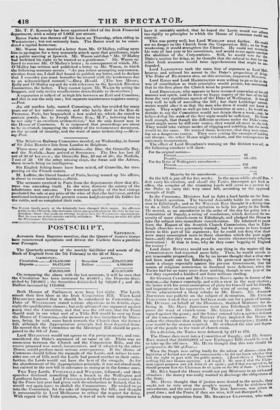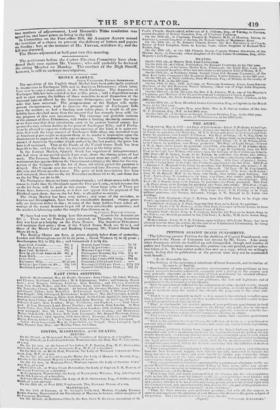Both Houses of Parliament were busy last night. The Lords
struck their first blow at the Irish Corporation Bill. When Lord MELBOURNE: moved that it should be considered in Committee, the Duke of Wer.uNoToN stated various objections to its details, espe- cially the qualification clauses ; but only advanced one argument against going into the Committee, and that was the old one, that the Peers should wait to see what sort of a Tithe Bill would be sent up from the House of Commons,—the measure as it was introduced by Minis- ters, being, he said, more harsh towards the Church than the keener bill, although the Appropriation principle had been departed from. He moved that the Committee on the Municipal Bill should be post- poned to the 9th of June.
Lord NIELBOURNE would not agreee to the postponement ; and con. considered the Duke's argument of no value at all. There was DO connexion between the Church mind the Corporation Bills, and the course proposed was novel, inconvenient, and if adopted by the other House, would produce most serious consequences. If the House of Commons should follow the example of the Lords, and refuse to con- sider one set of bills until the Lords had passed another to their satis- faction, the Lords would not have the best of the struggle. As for the abandonment of the Appropriation principle, it was not abandoned, but existed in the new bill in substance as strong as in the former ones.
Two Tory Lords, FITZGERALD amid WICKLOW, followed ; and their speeches disclosed something like a breach in the Wellington and Lyndhurst fortress. Lord FITZGERALD declared that the course taken by the Peers last year had given such dissatisfaction in Ireland, that he would not again agree to abolish the Corporations. He wished to go into the Committee, for the sake of improving the bill; and thought it unreasonable in Lord Melbourne to refuse the request for delay. With regard to the Tithe question, it was of spell vast importance to have it amicably settled, hat he hoped the Lords would not adhere too rigidly to principles in which the House of Conunons could 4— conTchuirs. was pretty well, but Lord Wicicsow went further. De cow: see no danger to the Church from the Corporation Bill; so far frau weakening, it would strengthen the Church. He could not reconcile his vote of last year to his conscience, and would never again saio.tion
the abolition of the Corporations. Still, he would vote for the Duke's motion for delay, as he thought that the refusal to wait for the other Irish measures would raise apprehensions that might be tin. founded.
Lord LANSDOWNE took the same line of argument as Lord Mei bourne, and refused his assent to the Duke's proposition of delay. The Duke of RICHMOND also, on this occasion, supported Ministers:. Lord RIPON and Lord HADDINGTON were willing to go as far in tie way of conciliation as their principles would permit, but maintained that in the first place the Church must be protected, Lord BROUGHAM, who appears to have resumed somewhat of his old manner and spirit, said he drew no happy augury of the fate of the bill from the very significant speech of the Duke of Wellington. It %easel', very well to talk of amending the bill ; but their Lordshilis' amend. ments would alter it so that the man who drew it would not know it again. They might as well go into Committee at once ; he would un- dertake to say the Committee would not detain them it week—nay, he believed that the work of the first night would be sufficient. He knew well enough, that though the different sections under the Duke's corn. mend might move by different routes, they would all meet in the end. They would take various modes of clipping and cobbling, but the result would be the same. He warned them, however, that they were enter. ing on a dangerous course. They were setting the example of holding out threats : the other House might retaliate, and the consequences he extremely. inconvenient. The effect of Lord Brougham's warning on the division was nit; es the following numbers will show.
For the original motion-
3841-115
Present Proxies
For the Duke of Wellington's amendment—
Present 132 Proxies 00-192 Majority for the amendment 77 So the bill is put off' for five weeks. In the meatrwhile, should Bur. dett carry his election, and should the Tories thereupon get hack to office, the scruples of the trimming Lords will serve as a pretext for the Duke to carry this very same bill, according to the approved example of 1829.
In the Commons, Ministers had to fight a hard battle on the Scot- tish Church question. The General Assembly holds its annunl ses- sion in Edinburgh ; and so Sir WILLIAM RAE thought it a fitting tinie to do a little Parliamentary agitation to help his party in the North. He moved, as an amendment to the order of the day for going into a Committee of Supply, a string of resolutions, which declared the ne- cessity of more church-room in Edinburgh, end pledged the House to take the subject into immediate consideration. He laboured to prove from the Report of the Scottish Church Commission, that in Edits. burgh churches were grievously wanted ; but he seems to have brokea down in this part of his argument ; for he could not deny that there were many unoccupied seats in those churches which the poor might have—only that they were too proud to receive eleemosynary religious instruction ! If that is true, why do they come begging to England for money? Lord JOHN RUSSEI.L would not do any thing in the matter till the Commissioners had reported more fully. Then, he would accede to any reasonable proposition. He by no means thought that a clear ease had been made out for Edinburgh. He protested against its being made a charge especially ugainst the present Government, that the means of religious instruction in Scotland were deficient, when the Tot ies had km so many years done nothing, though in one year of the war they expended a hundred mind forty millions sterling. Sir GEORGE CLERK and Mr. CUNIMING Bauce spoke in favour of the motion,—the former cunningly, and with a view to the next election; the letter with his usual assumption of piety for himself and his friends, and imputation on his opponents of the want of saving grace, Mr. HUME administered a sharp rebuke to Mr. Bruce. Mr. ANDREW JOHNSTON WaS pathetic On the subject of destitution. 'Mr. Cunee, FERGUSSON denied that a case hail been made out for a grant of money. Mr. DUNLOP, on behalf of the Dissenters, thanked :11inisters for re- fusing it. Mr. Hoer JOUNSTON went into Edinburgh statistics to prove the want of chureloroom Mr. GILLON and Mr. flimsies argued against the grant ; and the latter entered into a spirited defence of the Commissioners. Sir Romer PEEL implored the 'liaise to endow the churches that might be ereeted by subscription ; 20,0001. a year would be the utmost required. He attributed the vice and depra- vity of the people to the want of church-room.
On a division, the Tories were defeated, by 217 to 176.
The House then went into a Committee of Supply; and Mr. SPRING, Rice: moved that 24,000,000/. of new Exchequer Bills should be issu d to take up the old ones. Mr. HUME thought that this vote should be postponed to the 91h rf June — When the People were calling loudly for the reform of abuses—when the legislation of Ireland was stopped unnecessarily—he did not know whether they had the right to part with the public money. (Loud cheers.) There was nothing like two houses agreeing. (A laugh.) lie moved that the Chair- man report progress and w.k leave to sit again ; and if that was agreed, to, he should propose that the Chairman do sit again on the 9th of June. ( Cheers.) Mr. RICE hoped the House would not put Ministers in an aet:kward situation ; the money was really wanted to discharge the obligations of the State.
Mr. Hume thought that if justice were denied to the people, they ought not to vote away the people's money. But he withdrew his amendment, and the vote passed. The hint, however, was given io good time ; and the Peers, if they are wise, will not disregard It.
After some opposition from Mr. SHARMAN CRAWFORD, who made
two motions of adjournment, Lord Nlortreth!s Tithe resolution was agreed to, and leave given to bring in the bill.
In Committee on the Post-office Bill, Stir ANDREW AGNEW moved the insertion of a clause. to prevent the delivery of letters and papers on Sunday ; but, at the snstance of Mr. Tasvon, withdrew it ; and the
bilbwas reported. The House adjourned at half-past two this morning.



























 Previous page
Previous page